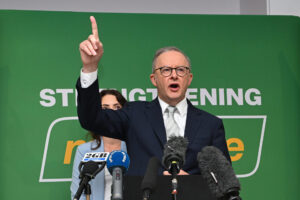by Ebony Bennett
[Originally published in The Canberra Times, 22 February 2020]
I’m not a revhead, but I come from a Holden family. Not a Holden worker family, but the type of Holden family that used to get up before sparrow’s fart to catch the bus five hours to Bathurst to watch Peter Brock race (my job as a kid was to pre-butter loaves of bread for the sausage sizzle). The kind of Holden family where my brother forbid Dad from parking the work ute in our driveway for the crime of being a Ford.
Many people can’t see the fuss about this week’s announcement that the Holden will be no more. Perhaps they don’t remember that there was a time when almost half of cars sold in Australia were Holdens, and that practically every country town has a local Holden dealership. “How’s the serenity?” is now firmly part of the Aussie lexicon, but to me the most iconic line of The Castle was when Darryl Kerrigan asked Steve to move the Camira so he could get the Torana out so he could get to the Commodore.
There’s no denying Holden is an Australian icon. Just as there’s no denying that the end of Holden was not inevitable, it was a failure of industry policy.
Australia used to be one of just 13 countries in the world that could build a car from beginning to end, so don’t believe anyone who tries to tell you Australia doesn’t have the specialised skills required to build cars. Also don’t believe anyone who tries to tell you Australia’s car industry just can’t compete internationally. Germany is the largest economy in the EU and it has a carbon price, high wages and high taxes, as well as a world-class car industry. The United States doesn’t have the lowest wages or the lowest company taxes, yet Tesla is leading the electric vehicle market worldwide.
Australia could have been at the forefront of the electric vehicle industry. We have an educated and skilled workforce, a stable democracy (relative to world standards at least) and we have huge deposits of lithium for batteries. All the ingredients are there. But the Coalition government’s only car industry policy over its last three terms has been to dare it to leave, and then leave it to die.
Of course, Holden itself shares the blame. People are rightly pointing out that Holden made cars people no longer wanted to buy. Its parent company General Motors was hit badly by the GFC, and there’s nothing like a global recession to retard innovation and investment. On the other hand, Tesla has made its money and reputation building cars no one even knew they wanted. But even Tesla relied on government support to succeed, receiving a $US465 million loan (which it paid back nine years early) to build a new assembly plant as part of President George W Bush’s Advanced Technology Vehicles Manufacturing loans program. In any case, the US government backed advanced manufacturing.
In Australia, the mere suggestion of supporting electric vehicles prompted a hysterical prediction from the Morrison government that EVs would end both the ute and the weekend. Instead we got the end of Holden.
The death of Holden is, of course, sad for more reasons than just nostalgia. Thousands of Australians lost their jobs as car-manufacturing plants closed one by one. They were good jobs, with good pay and good conditions – the kind of good, permanent jobs that allow people to buy and pay off a house while raising a family. In short, they were the kind of good, permanent jobs that are increasingly hard to secure, or no longer exist, in much of the private sector.
The Australian Manufacturing Workers’ Union says that one year after the factory closed, less than 5 per cent of Holden workers were working in a job that had either the same or better working conditions. Let that sink in. One year on, more than 95 percent of Holden workers were worse off.
The social dislocation this causes is enormous, not just for workers but for whole communities. The remaining Holden workers who will now be made redundant are entering a sluggish economy and a labour market with the slowest wages growth since World War II, where unemployment and underemployment are growing fast.
The manufacturing industry employs 18 times as many people as the coal-mining industry. But you would be forgiven for thinking it was the other way around, given that people like Matt Canavan talk endlessly about coal jobs while the government rarely gives manufacturing jobs a mention.
Employment in manufacturing has been in steady decline since the late 1980s. The hollowing out of Australia’s manufacturing industry is a big problem because manufacturing is the most important source of innovation in the economy. It supports better-than-average productivity growth and good jobs. Something the economy sorely needs right now.
Instead of creating industry policy that aims to reverse this decline in manufacturing, those managing the economy are content to remain heavily reliant on digging resources (mostly fossil fuels) out of the ground without adding any value to them. A recent Harvard University study ranked the complexity of Australia’s economy as on par with those well-known powerhouse economies of Uganda and Senegal. As The Financial Review so memorably put it: “Australia is rich, dumb and getting dumber”.
Lithium is the perfect example of Australia’s dumb and dumber industry policy. The world market for electric vehicles right now is like the world market for smartphones a decade ago – ready to take off. Australia is naturally blessed with lithium, which we dig out of the ground and export overseas for a tidy profit. But that’s all we do with it. If we refined the lithium before we exported it, the Australian economy could capture 10 times the value of raw lithium, according to research from The Australia Institute’s Centre for Future Work. If we manufactured Australian batteries with Australian lithium, the economy could capture even more value because batteries retail for much more than refined lithium and more Australian households are opting to install batteries alongside their rooftop solar panels to reduce their electricity bill. If our economy manufactured Australian electric vehicles, using Australian batteries, using Australian refined lithium – well, then we’re really off to the races.
Hopefully the end of Holden is the kick in the pants the government needs to develop a vision for a Lithium Valley to rival Silicon Valley. Sadly, Australia’s policy debate is so far behind that the government still hasn’t moved to improve fuel-efficiency standards. Coalition MPs and industry have been quick to call for an end to the luxury car tax to make BMWs cheaper, but silent on the case for improved fuel-efficiency standards – which would reduce costs for Australian drivers every time they fill up the tank and improve air quality for everyone.
Clean air has a lot more value since millions of Australians choked through weeks of toxic bushfire smoke during the bushfire crisis. But unless our fuel-efficiency settings change soon, Australia is destined to become the dumping ground for inefficient, polluting gas-guzzlers no one else wants to buy (sound familiar?), chaining millions of Australian families to the petrol pump and rising oil prices.
In the meantime, my hope is that, just as BMW reinvented the Mini Cooper, one day GM sees fit to reinvent the gorgeous Holden FJ as an electric ute. Don’t tell me I’m dreaming. Vale Holden.
Ebony Bennett is deputy director of independent think tank the Australia Institute. Twitter: @ebony_bennett.
Between the Lines Newsletter
The biggest stories and the best analysis from the team at the Australia Institute, delivered to your inbox every fortnight.
You might also like
5 ways and 63 billion reasons to improve Australia’s tax system
With a federal election just around the corner, new analysis from The Australia Institute reveals 63 billion reasons why our next Parliament should improve the nation’s tax system.
Business groups want the government to overhaul the tax system? Excellent – we have some ideas.
The landslide win by the ALP has seen business groups come out demanding the government listen to their demands despite having provided them no support, and plenty of opposition, over the past 3 years.
Why you shouldn’t be scared of these super changes
The election might be over, but the next big scare campaign is just getting started. The subject this time is the Albanese government’s planned changes to taxes on superannuation.


